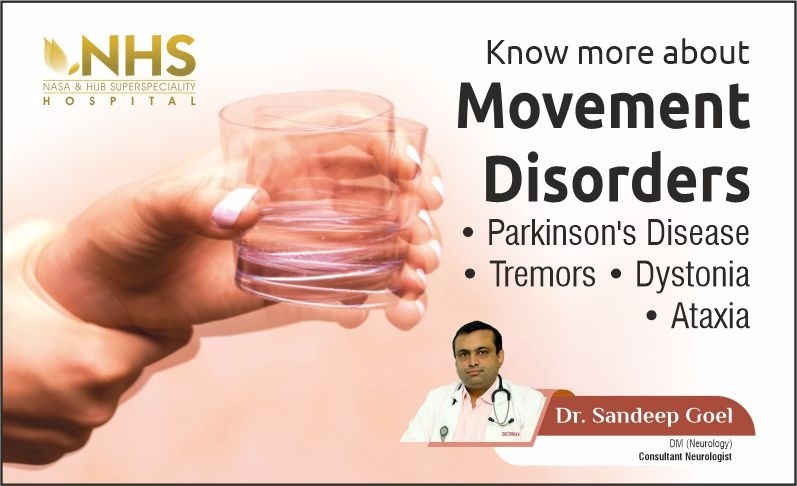Movement disorders encompass a group of neurological diseases that affect the ability to control and coordinate movements. These disorders can significantly impact daily life, causing tremors, stiffness or slowness of movement. Effective management of movement disorders requires a multidisciplinary approach, tailored treatment plans, and ongoing support. NHS Neurocare, guided by experts like Dr. Sandeep Goel, is dedicated to providing comprehensive care for individuals with movement disorders.
Understanding Movement Disorders
Movement disorders are a group of neurological diseases characterized by abnormal movements. Common movement disorders include:
- Parkinson’s Disease: A progressive disorder characterized by tremors, stiffness, and slowness of movement. It is caused by the loss of dopamine producing neurons in the brain.
- Essential Tremor: A condition causing rhythmic shaking, usually affecting the hands, head, or voice. It often worsens with movement and can be debilitating.
- Dystonia: Characterized by sustained muscle contractions, abnormal postures, and twisting movements. It can affect different parts of the body, including the neck (cervical dystonia) and hands (writer’s cramp).
- Chorea: Involves irregular, rapid, and unintentional movements. Huntington’s disease is a common cause of chorea.
- Ataxia: Affects coordination and balance, leading to unsteady movements and difficulty with fine motor skills.
Diagnosing Movement Disorders
Diagnosing movement disorders typically involves a thorough medical history, neurological examination, and / or imaging tests. At NHS Neurocare, Dr. Sandeep Goel and her team employ advanced diagnostic techniques to accurately identify the specific type of movement disorder and its severity. This may include:
- Clinical Evaluation: A detailed assessment of symptoms, medical history, and family history helps in diagnosing Movement Disorders thoroughly.
- Neuroimaging: MRI or CT scans may be used to visualize brain structures and rule out other conditions that may cause movement disorders.
- Genetic Testing: For disorders with a genetic component, such as Huntington’s disease and others, genetic testing can provide valuable information.
Treatment Approaches
Effective management of movement disorders involves a combination of medical treatments, therapies, and lifestyle modifications. NHS Neurocare offers a comprehensive approach to treatment, tailored to each patient’s needs.
- Medications: Medications play a crucial role in managing movement disorders. For example:
- Parkinson’s Disease: Levodopa, dopamine agonists, and MAO-B inhibitors along with other classes of drugs are commonly prescribed to manage symptoms.
- Essential Tremor: Beta-blockers and anticonvulsants may help reduce tremors.
- Dystonia: Botulinum toxin injections can relieve muscle contractions, while anticholinergic drugs may be used in some cases.
- Surgical Interventions: For patients who do not respond well to medications, surgical options are refractory to:
- Deep Brain Stimulation (DBS): This involves implanting electrodes in specific
brain regions to regulate abnormal impulses. DBS is effective for Parkinson’s
disease and essential tremor.
- Deep Brain Stimulation (DBS): This involves implanting electrodes in specific
- Physical Therapy: Physical therapy is essential for maintaining mobility and improving quality of life. Therapists work with patients to enhance strength, flexibility, and coordination. For example, Dr. Sandeep Goel’s team at NHS Neurocare emphasizes tailored exercise programs to address the specific needs of patients with movement disorders.
- Occupational Therapy: Occupational therapists help patients adapt to daily activities and improve their ability to perform tasks. This may involve strategies for managing fine motor skills and using assistive devices.
- Speech Therapy: Speech therapy is beneficial for individuals with movement disorders affecting speech and swallowing. Therapists work on improving communication skills and managing swallowing difficulties.
Multidisciplinary Care at NHS Neurocare
At NHS Neurocare, the management of movement disorders is a collaborative effort involving neurologists, physiotherapists, occupational therapists, speech therapists, and other specialists. Dr. Sandeep Goel, a leading neurologist at NHS Neurocare, emphasizes the importance of a personalized treatment plan. “Each patient’s experience with a movement disorder is unique. Our goal is to provide a comprehensive treatment plan that addresses both the physical and emotional aspects of the condition,” says Dr. Goel.
NHS Neurocare’s multidisciplinary approach ensures that patients receive holistic care, addressing various aspects of their condition and improving their overall quality of life. This includes:
1. Individualized Treatment Plans: Customizing treatment plans based on the specific type and severity of the movement disorder.
2. Ongoing Support and Monitoring: Regular follow-up appointments to monitor progress and adjust treatments as needed.
3. Patient Education: Providing patients and their families with information about the disorder, treatment options, and strategies for managing symptoms.
Support and Resources
Living with a movement disorder can be challenging, and support is crucial for patients and their families. NHS Neurocare offers various resources, including support groups, counseling services, and educational workshops. Dr. Sandeep Goel highlights the importance of a supportive network: “Managing a movement disorder involves not only medical treatment but also emotional and psychological support. We are committed to helping our patients navigate their journey with the right resources and guidance.”
Conclusion
Effective management of movement disorders requires a comprehensive and individualized approach. NHS Neurocare,(A unit of NHS Hospital) under the expertise of Dr. Sandeep Goel, provides exceptional care through a combination of medical treatments, therapies, and support services. By focusing on personalized treatment plans and multidisciplinary care, NHS Neurocare aims to enhance the quality of life for individuals with movement disorders, helping them achieve better health outcomes and improved daily functioning.

